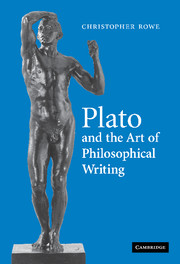Book contents
- Frontmatter
- Contents
- Preface
- Preliminaries: reading Plato
- THE DIALOGUES
- Introduction: The simile of the cave in the Republic
- 1 The Apology: Socrates' defence, Plato's manifesto
- 2 The Phaedo: Socrates' defence continued
- 3 ‘Examining myself and others’, I: knowledge and soul in Charmides, First Alcibiades, Meno, Republic, Euthyphro, Phaedrus
- 4 The moral psychology of the Gorgias
- 5 ‘Examining myself and others’, II: soul, the excellences and the ‘longer road’ in the Republic
- Appendix to Chapter 5: Socrates vs Thrasymachus in Republic I
- Interlude: A schedule of the genuine dialogues
- 6 Knowledge and the philosopher-rulers of the Republic, I: knowledge and belief in Book v
- 7 Knowledge and the philosopher-rulers of the Republic, II: the limits of knowledge
- 8 The Theaetetus, and the preferred Socratic–Platonic account of knowledge
- 9 The form of the good and the good: the Republic in conversation with other (‘pre-Republic’) dialogues
- 10 Republic and Timaeus: the status of Timaeus' account of the physical universe
- 11 Plato on the art of writing and speaking (logoi): the Phaedrus
- Epilogue: What is Platonism?
- Bibliography
- Index
7 - Knowledge and the philosopher-rulers of the Republic, II: the limits of knowledge
Published online by Cambridge University Press: 22 September 2009
- Frontmatter
- Contents
- Preface
- Preliminaries: reading Plato
- THE DIALOGUES
- Introduction: The simile of the cave in the Republic
- 1 The Apology: Socrates' defence, Plato's manifesto
- 2 The Phaedo: Socrates' defence continued
- 3 ‘Examining myself and others’, I: knowledge and soul in Charmides, First Alcibiades, Meno, Republic, Euthyphro, Phaedrus
- 4 The moral psychology of the Gorgias
- 5 ‘Examining myself and others’, II: soul, the excellences and the ‘longer road’ in the Republic
- Appendix to Chapter 5: Socrates vs Thrasymachus in Republic I
- Interlude: A schedule of the genuine dialogues
- 6 Knowledge and the philosopher-rulers of the Republic, I: knowledge and belief in Book v
- 7 Knowledge and the philosopher-rulers of the Republic, II: the limits of knowledge
- 8 The Theaetetus, and the preferred Socratic–Platonic account of knowledge
- 9 The form of the good and the good: the Republic in conversation with other (‘pre-Republic’) dialogues
- 10 Republic and Timaeus: the status of Timaeus' account of the physical universe
- 11 Plato on the art of writing and speaking (logoi): the Phaedrus
- Epilogue: What is Platonism?
- Bibliography
- Index
Summary
Socrates proposes in Republicv–vi that political rule should be put in the hands of philosophers, provided that they also ‘in no way fall short of [non-philosophers] in experience, nor rank after them in any other part of excellence’ (vi, 481d6–7). The question, especially for Glaucon, is what philosophers will bring to the task of ruling that non-philosophers cannot; and that will also be the question for the present chapter. It will turn out that there are two answers, one more sophisticated, one less so; the latter is nearer the surface, and more immediately persuasive for Socrates' (Plato's) immediate audience, while the former is truer to his real position – which will be the subject of a separate chapter (chapter 8).
Socrates begins his answer to Glaucon's question – why philosophers? – in that argument which I discussed in the preceding chapter, at the end of Book v. As we saw, his starting-point is that philosophers, lovers of wisdom, are distinguished as such by the fact that they love all aspects of wisdom, something which sets them apart from others who seem to love every aspect of something, like the ‘sight-lovers’, who are actually quite picky about what they love. The latter don't even recognize the very thing they should really be loving (beauty itself); they only recognize the many beautiful particulars, which they misidentify as beauty.
- Type
- Chapter
- Information
- Plato and the Art of Philosophical Writing , pp. 214 - 228Publisher: Cambridge University PressPrint publication year: 2007



